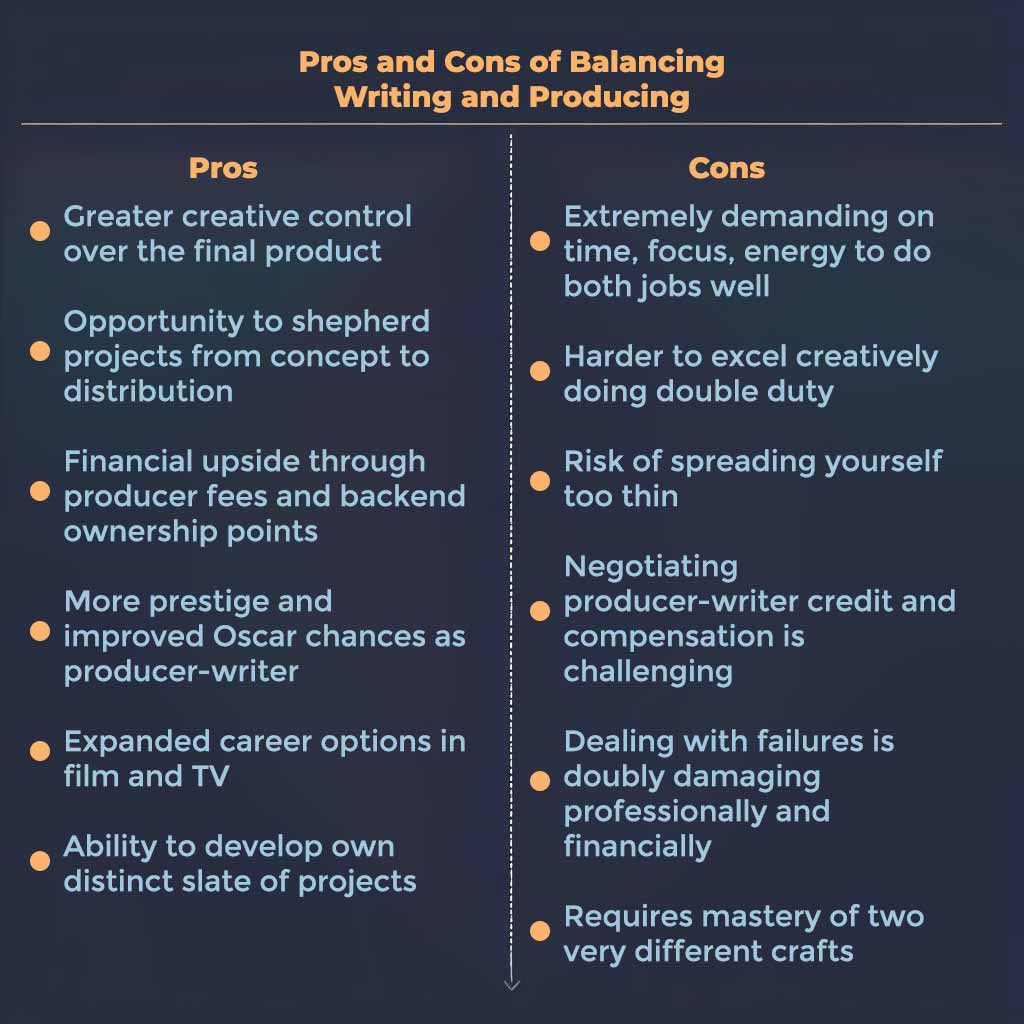For screenwriters, seeing your words come to life onscreen is a special feeling. But often, they have to relinquish creative control as the project goes into production. This leads many writers to wonder: can I have more influence by becoming a producer too?
In this article, we’ll break down how a screenwriter can pivot to take on a producer role and weigh the pros and cons of balancing both positions.
With insights from industry professionals and actionable steps, you’ll learn how to parlay your script into increased control over the filmmaking process.

Defining the Different Roles
Before exploring if screenwriters can transition to producing, let’s quickly define each role:
Screenwriter
The screenwriter conceptualizes and writes the film’s script and screenplay. Some of the responsibilities of a screenwriter include crafting the story, characters, structure, dialogue, and scene details that serve as the creative backbone of the project.
Producer
The producer oversees many logistical aspects like securing financing, managing the film’s budget and schedule, assembling the creative team, facilitating casting, liaising with the studio, and coordinating promotional efforts.
Though often complementary, the two roles have distinct responsibilities that require different skill sets and experiences. Understanding these intricacies is key for screenwriters looking to tackle producing.
Why Screenwriters Want Producing Credit
While most screenwriters focus solely on writing great scripts, many start looking to production in hopes of:
- Having more creative control over their vision. Without producing influence, writers often languish as others make changes.
- Improving their earnings potential. Producer fees, backend points, and revenue shares can mean big money.
- Shepherding their project start-to-finish. Writers crave being involved through completion, not just script hand-off.
- Gaining prestige as a produced writer-producer. Buoyed Oscar hopes and industry cachet.
- Opening more career opportunities on both sides. Broad skill building.
But the lure of more money, control, and credit that inspires writers to look to producing should be balanced with the reality of the vastly different skill sets involved. Is making the leap feasible?

The Challenges Writers Face When Transitioning to Producing
Eager as they may be, screenwriters face considerable hurdles stepping into the producer role, like:
- Lack of connections to financiers to fund projects. Unproven track record securing financing.
- No experience negotiating contracts and managing complex film budgets.
- Leadership deficits overseeing teams and making executive decisions.
- Minimal clout advocating to studios, networks, and talent agencies. Unleveraged relationships across the industry.
- Difficulty delivering a compelling producer pitch versus writing aptitude. Untested packaging instincts.
Without the right business acumen, network, leadership ability, negotiation skills, and killer instinct, making the transition into producing can prove extremely difficult. But not impossible with the right strategy.
Tips for Screenwriters Looking to Produce
If you’re a screenwriter keen to wade into producing, here are some practical steps to build up your producer credentials:
- Partner with a production company. Linking up with a producer to collaborate on your script is a great education. Observe their process of finding financing, managing logistics, dealing with the studio, collaborating with the director, securing talent, balancing the budget, problem-solving hurdles, etc. Pay attention to all they juggle to turn the script into a film.
- Invest in classes. Take courses and workshops on film production, business, and management. UCLA Extension, NYU, and AFI all offer programs to build critical knowledge that goes beyond writing. Immerse yourself in leadership, budgeting, pitching, and negotiating skills.
- Join professional organizations. Get involved with groups like the Producer’s Guild of America to expand your network and get up to speed on the latest industry trends from the producer’s perspective. Attend mixers and events.
- Build up business and legal fluency. Understand contracting, negotiating, financing, distribution, marketing. Sit in on calls between producers, agents, and studio executives. Consult entertainment lawyers. Learn the language.
- Start small. Don’t aim to produce a huge budget feature right away. Look for opportunities to produce more manageable projects like short films, commercials, web videos, etc. Get your feet wet in a contained environment.
- Enlist support. Surround yourself with a team to handle areas where you lack experience like legal, accounting, fundraising, budgeting, casting, and marketing. Don’t go it alone.
- Leverage existing scripts. Use scripts you’ve already written as calling cards when pitching yourself as a producer. Your portfolio gives you an advantage over producers starting from scratch development-wise.
- Know when to compromise. Be prepared to make painful sacrifices to see the project succeed. Whether it’s budget cuts, casting changes, or story edits, producing often means putting the film first.
With this multi-pronged strategy of on-the-job learning, skill building, networking, and leaning on others’ expertise, a screenwriter can pave their way to producer success.
The Pros and Cons of Balancing Writing and Producing
If you’re able to build up your producing bona fides, next comes the challenge of balancing producer duties with screenwriting. What are the key advantages and challenges of taking on this dual role?

Pros:
- Greater creative control over the final product
- Opportunity to shepherd projects from concept to distribution
- Financial upside through producer fees and backend ownership points
- More prestige and improved Oscar chances as producer-writer
- Expanded career options in film and TV
- Ability to develop own distinct slate of projects
Cons:
- Extremely demanding on time, focus, and energy to do both jobs well
- Harder to excel creatively doing double-duty
- Risk of spreading yourself too thin
- Negotiating producer-writer credit and compensation is challenging
- Dealing with failures is doubly damaging professionally and financially
- Requires mastery of two very different crafts
Many who reach that elite producer-writer status describe it as all-consuming but immensely rewarding. Going down this path should not be taken lightly. But embracing the grind could pay off big time.
Notable Screenwriters Who Became Successful Producers
For inspiration, let’s look at several screenwriters who leveraged their scripts into powerhouse-producing careers:
Ava DuVernay
Early films like Middle of Nowhere and Selma established DuVernay’s writing gifts. She parlayed that into becoming a prolific producer-director with acclaimed series like When They See Us and Colin in Black & White.
Shonda Rhimes
From indie screenwriting beginnings, Rhimes evolved into one of TV’s most influential producer-showrunners. Grey’s Anatomy alone was a masterclass in long-running hit production.
Tyler Perry
Perry’s tremendous output as a multi-hyphenate producer-writer-actor-director with his Madea franchise and BET media ventures make him a mogul. He turned content ownership into generational wealth.
Peter Jackson
Jackson transitioned from small indie films in New Zealand into a producer powerhouse at the helm of the Lord of the Rings and Hobbit trilogies—among the most successful Hollywood franchises ever.
Bruna Papandrea
Transitioning from screenwriting into producing hit projects like Gone Girl and Big Little Lies has made Papandrea one of the most in-demand producers in the industry.
Judd Apatow
From TV scripts to major comedy films like Bridesmaids and Trainwreck to producing cult classics like Girls and Superbad, Apatow is a prime example of producing success rooted in writing.
J.J. Abrams
Abrams’ prolific output as a producer of TV and film hits from Lost to Westworld to major franchises like Star Trek and Star Wars makes him the prototype of the 21st century producer-writer.
These examples reveal the type of heavyweight, highly-compensated producing careers those with screenwriting backgrounds can cultivate with the right hustle and perspective.

Key Takeaways on Transitioning from Screenwriter to Producer
For screenwriters with big producing dreams, the key lessons distill down to:
- Learn the craft of producing through coursework, job shadowing, and organizations
- Build up your business and legal knowledge around the filmmaking process
- Start small with shorts, commercials, low budget projects to gain experience
- Use existing scripts as leverage when pitching yourself as a producer
- Surround yourself with a team to bolster your weaknesses
- Understand the immense commitment required to balance writing and producing
With the right blend of persistence, shrewdness, and creativity, a screenwriter can successfully evolve into a producer—the ultimate Hollywood power position. The rewards will justify the grind for those game to hustle.
Frequently Asked Questions
Is a screenwriter a producer?
No, a screenwriter and producer play different roles in making a film. The screenwriter authors the script while the producer oversees the film’s financing, development, and physical production. However, it is possible for some screenwriters to also produce films, taking on a dual role.
Can a writer also be a producer?
Yes, it is possible for writers to expand their responsibilities and become producers as well. Many successful Hollywood figures like Shonda Rhimes, Tyler Perry, and Greta Gerwig balance writing and producing roles. It allows them more creative control.
Do producers hire screenwriters?
Yes, identifying and hiring the screenwriters is an instrumental part of the producer’s job. They may hire writers to create original scripts or adapt existing material into screenplays. Producers collaborate closely with writers.
Is screenwriting part of production?
No, screenwriting takes place in pre-production before the physical production begins. Writers are usually done with their main duties once the script is finished before filming starts.
Who owns a film the writer or producer?
Typically the production company and producers own the film, not the screenwriter. Writers are paid for their work on the script but usually do not retain an ownership stake. Producers acquire the rights and finance the film.
What do screenwriters produce?
Screenwriters produce written content – like scripts, screenplays, treatments, outlines, and character bios. Their main output is delivering these documents to producers that provide the story foundation.
Why are screenwriters paid so little?
Despite being integral to films, screenwriters are seen as replaceable hired talent, earning only a flat fee. They lack ownership which is where the big money lies. Top producers and directors earn much more.
Do producers do editing?
No, specialized film editors handle the editing process. However, producers oversee the editing and collaborate with editors to ensure it aligns with the director’s creative vision.
Do producers write the story?
Rarely. Producers develop stories to be turned into films but hire professional screenwriters to actually write the script based on that idea. Some producer-writers do both.


